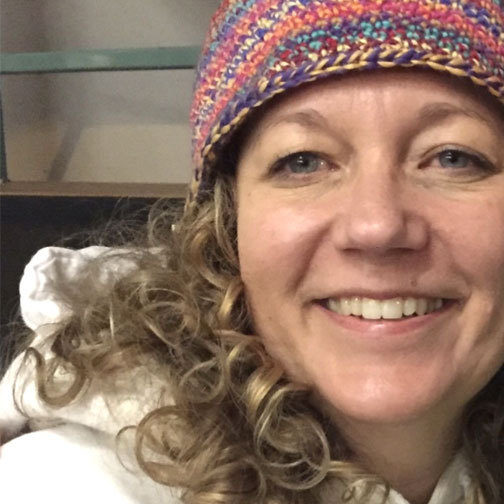Nasal Glucagon Gives Me Peace of Mind
 For a person relatively newly diagnosed with type 2 diabetes, Alicia Meader talks about the importance of diabetes education, patient advocacy, as well as her life with diabetes, as if she’d been living with it for years. As part of her newfound diabetes advocacy, she’s making it a part of her mission to help others with type 2 diabetes adjust to life with it. One of the ways she’s contributing is by talking about hypoglycemia and why it’s important to stay prepared by having Baqsimi, the nasal glucagon on hand in the case of a severe low blood sugar emergency. Read our interview with Alicia below and why having Baqsimi gives her peace of mind.
For a person relatively newly diagnosed with type 2 diabetes, Alicia Meader talks about the importance of diabetes education, patient advocacy, as well as her life with diabetes, as if she’d been living with it for years. As part of her newfound diabetes advocacy, she’s making it a part of her mission to help others with type 2 diabetes adjust to life with it. One of the ways she’s contributing is by talking about hypoglycemia and why it’s important to stay prepared by having Baqsimi, the nasal glucagon on hand in the case of a severe low blood sugar emergency. Read our interview with Alicia below and why having Baqsimi gives her peace of mind.
BT2: Thank you for speaking with us! Let’s start with your type 2 diabetes diagnosis story. When were you diagnosed with diabetes and do you have a family history of it? How did your doctor choose to treat you?
Alicia Meader: I was actually diagnosed two days before my birthday, this past August. I went in for a regular check-up and my blood sugars were incredibly high. Shortly after that, I was put on Tresiba and Victoza. I didn’t know of anyone in my family that had diabetes. My parents were shocked and then said my great-grandmother & a great-great-grandmother had it on my father’s side. My father told me that when he was 14, he’s 83 now, he was prediabetic. My grandmother was able to get him back under control through diet.
Did you know anything about type 2 diabetes prior to your diagnosis? As far as diet and exercise are concerned, did you have to make any changes?
I didn’t know much about diabetes. I’d heard type 2 diabetes was only diagnosed in people who were overweight. I now know that is not always the case.
When it comes to exercise, I have other autoimmune diseases including fibromyalgia, it’s difficult for me to do intense exercises. I had been walking for exercise and that’s pretty much what I do now along with very low impact weights. I also increased the amount of time I do yoga. Exercise doesn’t need to be in a fancy expensive gym. I look up yoga stretches on YouTube or Pinterest and do them at home. My walks have just been in my local neighborhood, an occasional park when I can get there and sometimes when the weather has been especially cold I walk back and forth in my house. That last one can be really boring but it eliminates excuses!
You mentioned when your doctor, put you on Victoza and Tresiba, he was worried about your blood sugar dropping too low. What options did he present to you?
He asked me if I would rather have an emergency injection on hand or a nasal spray. I chose the nasal spray. I was afraid that if I got into a situation of low blood sugar if I passed out, I couldn’t help someone help me. A nasal spray would be the safest bet for me to get the help I needed from a stranger or a friend. It just seems so convenient, less intense and less preparation than an injection. What if someone who is trying to help me is afraid of needles? What if someone hesitates to give me an injection? An injection seems very personal to me. The nasal spray seemed like the perfect option.
The nasal spray is going to help so quickly and is very user-friendly to someone that knows nothing about diabetes or how to help. Using the nasal spray was something I put on my medical ID bracelet. I always have the nasal spray Baqsimi with me. My medical ID has my emergency contact—my husband—and it says to use the nasal spray. Even if it’s a stranger helping, the spray is easy to identify because of its bright yellow packaging. It’s about the size of a common inhaler.
Can you share your experiences with low blood sugar? Did your doctor explain the signs of hypoglycemia to you?
He did. At the time of my diagnosis, my blood glucose was in the 27.7 mmol/L500s mg/dL. It didn’t seem like a low blood glucose level would ever be a possibility. After being put on Tresiba and Victoza, my numbers continued down. I’m in a safe zone of blood glucose in the 5.0 mmol/L90 mg/dL. My lowest number has been 4.1 mmol/L74 mg/dL. I did sometimes experience some of the symptoms related to hypoglycemia. It made it that much more important to keep my testing kit and nasal spray on me as I was getting used to these new medications.
You mentioned your husband’s name is on the emergency contact information. Did you have to educate him on recognizing low blood sugar in you?
Yes, I did. He tends to fall asleep before I do so in the beginning I even woke him up to say, “I’m not so great right now, can you sleep lighter, just in case?” He also notices personality changes when my blood sugar is getting low, even if I don’t notice those changes.
In your opinion, why is having Baqsimi a better option than simply giving someone candy or juice? Has anyone had to use Baqsimi on you?
I think Baqsimi is a foolproof way of helping someone. It is a measured dose to help every time. Even if there is candy or juice available, you don’t know if it will raise your blood glucose too high. I also worry about choking on candy if a person is starting to pass out. Baqsimi gives a person the precious needed moments before a doctor can be seen. Even bystanders can immediately help with the nasal spray because it is so easy to use.
I’m thankful that I have not had to use it. I’m very thankful for having it here just in case because it brings me peace of mind.
What words of encouragement would you give to a person with type 2 diabetes who’s going to be reading this article and who have low blood sugar episodes, but just don’t know how to advocate for themselves?
I’m fairly new to this diagnosis and I’ve gone through a lot of ups and downs physically and mentally. Advocating for yourself is very important. That involves asking questions and to ask the right questions, you need to educate yourself. Conveniently, something as simple as YouTube can help. Be sure to go to reliable sources. Endocrinologists, pharmacists and the sites that your medicine packaging states can be found on YouTube.
A person shouldn’t blindly take advice from others even though they are trying to be helpful. Everyone is different and medications are different. Learn as much you can about this condition. I try to learn something new every day. That has helped me deal with something that seemed impossible at the beginning.
With diabetes, some people only see the disease and not the person living with it. What else would you like our community to know about you?
A disease affects every part of my life now, but I don’t want it to be all I ever think about. I like to read, crochet and spend time with my animals. I also like to travel. It doesn’t have to be far. A road trip is fine. Once restrictions on traveling are lifted, I will say “have (diabetic-friendly) snacks, will travel!”
This diagnosis has made me search for different ways I can eat the foods that I like. I found out pizza can be made with a plant-based food wrap! Heat the wrap in a frying pan then a little sauce and cheese. Boom! Your very own personal pizza. In the end, it’s about moderation and learning how different foods affect me. It’s not about denying myself all of the time. I can have fun and still manage my diabetes.
This content was made possible with support from Baqsimi, a Founding Partner of Beyond Type 2.





